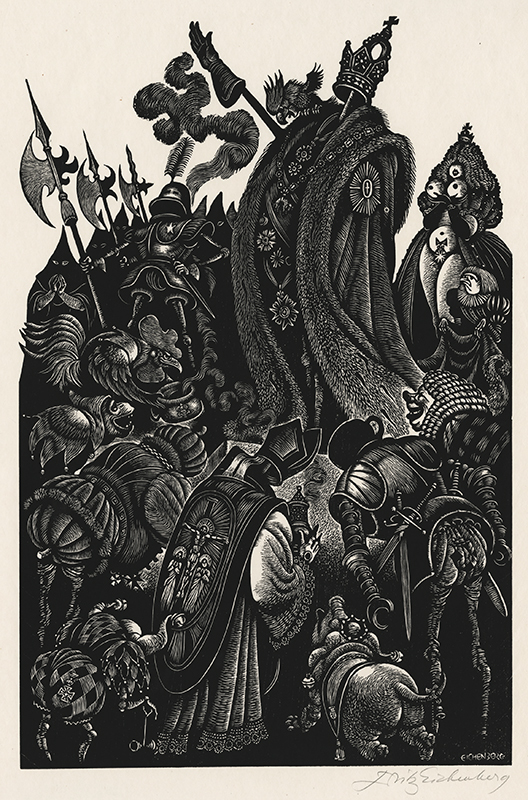
19th, 20th & 21st Century Fine Prints
707-546-7352 · fax 707-546-7924 · web: www.annexgalleries.com · email: artannex@aol.com
The Follies of the Court (plate VIII from: In Praise of Folly Portfolio of 10 woodcuts) by Fritz Eichenberg

The Follies of the Court (plate VIII from: In Praise of Folly Portfolio of 10 woodcuts)
Fritz Eichenberg
The Follies of the Court (plate VIII from: In Praise of Folly Portfolio of 10 woodcuts)
Fritz Eichenberg
1901 - 1990 (biography)Fritz Eichenberg did ten illustrations for Erasmus' "In Praise of Folly" of which this image is number eight. There was an edition of 150 portfolios, numbered 1 to 150; a preferred edition numbered I to X, issued in a portfolio with a cancelled block; ten copies numbered A to J for the collaborators; and 100 examples printed separately with wider margins. This impression is from the edition of 150, number 102/150.
Encomium Moriae (In Praise of Folly) was written in 1509 by Dutch Catholic theologian Desiderius Erasmus as a satirical commentary on the Latin Church; namely, ecclesiastical promotion of European superstitions and illogical social mores and laws. Erasmus explained his criticism by imagining the world seen through the eyes of Folly. Despite the serious nature of his critcisms, a sharp hilarity ensues.
Fritz Eichenberg's illustration centers around a "king" and his worshipping court. The king is shown to be only a crown and royal vestments propped up on sticks, with a squawking parrot for a voice. Below this puppet leader are the prostrate figures of the Pope, warlords, knights, and land barons, all of whom are constructed of vegetables, teacups, and animal parts - nothing human to be found, save for the shadowy henchmen in the background, hands rubbing greedily together, and female figure who is presented only as breasts and a womb, stripped of autonomy, meant only for pleasure and reproduction. Eichenberg's biting 1970s illustration exhibits updates to Erasmus' Renaissance-era criticism, with the use of the puppet king's Hitler-like stance and the Klan-reminiscent hoods of the henchmen.
Erasmus' writing was based on that of Italian humanist Faustino Perisauli's De Triumpho Stultitiae, but Erasmus' writing was far more witty and, therefor, popular. It is thought to have played a large part in inspiring the Protestant Reformation, due its sly criticism of Catholicism's abuse of power. This popularity surprised and ultimately dismayed Erasmus, the first editor of the New Testament and a dedicated Catholic himself who, because of his devotion, found it necessary to question the church's intentions. In Praise of Folly would inspire many writings of similar ideological bases, including Hans Christian Andersen's The Emporer's New Clothes.
